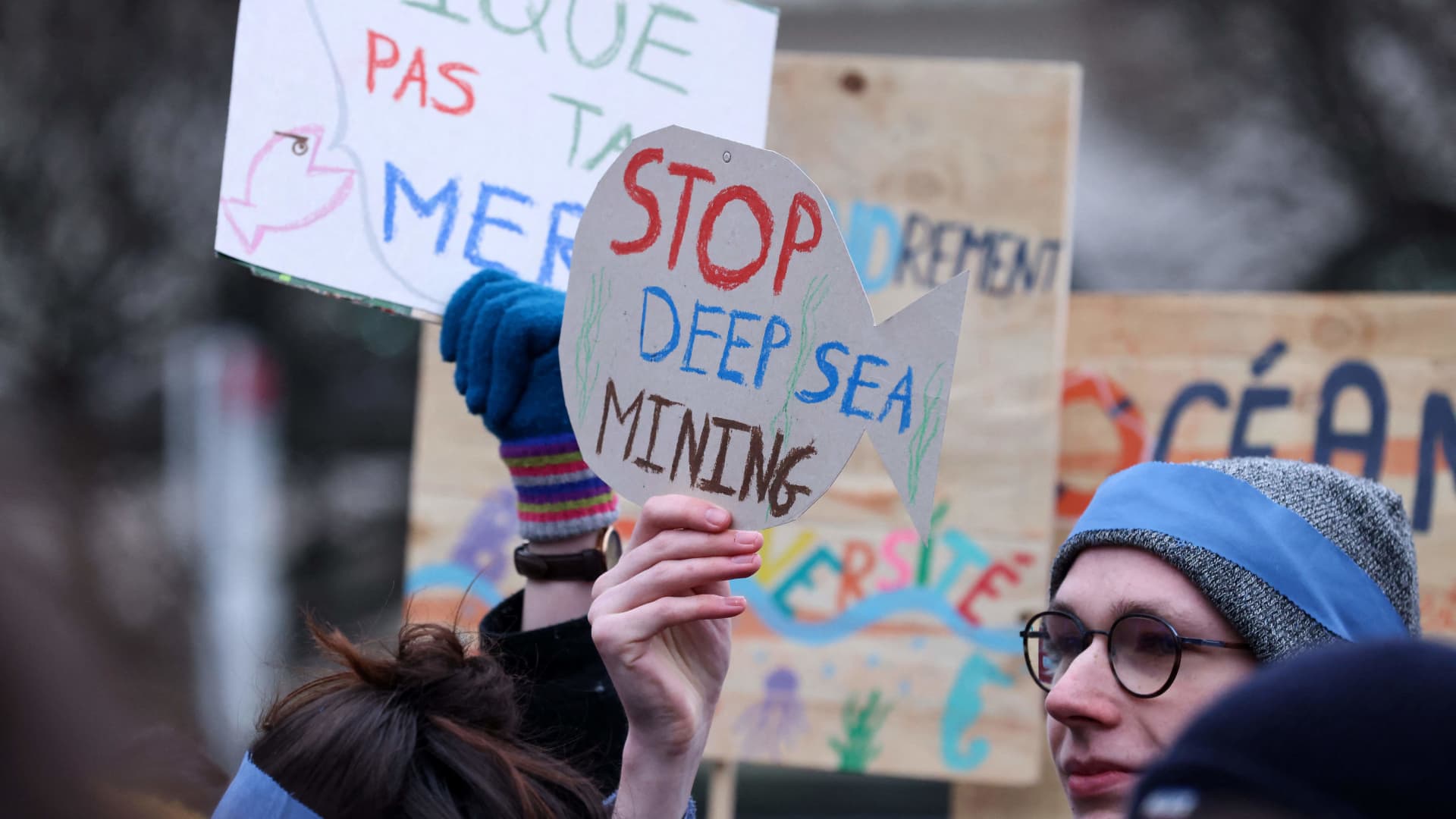
Activists at a “Look Down action” rally to stop deep sea mining, outside the European Parliament in Brussels on March 6, 2023.
Kenzo Tribouillard | Afp | Getty Images
It’s likely only a matter of time before scraping the ocean floor for valuable metals becomes a reality, according to the head of the International Seabed Authority, the U.N. regulator that oversees deep-sea mining.
Michael Lodge, secretary-general of the ISA, told CNBC that global interest in deep-sea mining has climbed to levels not seen since the 1970s, with advocates clearly excited by the industry’s potential role in the energy transition.
“One of the main drivers of industrial interest is the potential to produce larger quantities of minerals at equivalent or lower cost to what can be produced on land,” Lodge told CNBC via videoconference.
“That’s the commercial driver and certainly there is vast resource potential in seabed minerals. The question is whether they can in the end be produced economically,” he added.
“But the resource potential is absolutely there. This is clear. The technology is advanced, so it seems like it is possible. And at the same time, it is very clear also that demand for minerals is increasing exponentially and is only going to continue to increase.”
His comments come as the ISA prepares to recommence talks on deep-sea mining in Kingston, Jamaica next month. The seabed watchdog’s forthcoming session will seek to iron out a regulatory framework that, if adopted, would give the go-ahead to deep-sea mining on a commercial scale.
Established 30 years ago, the ISA regulates mining and related activities in an area that covers around 54% of the world’s oceans. The group consists of 168 member states and the European Union. The U.S. is not a member of the ISA.
It hasn’t been done yet so it is very hard to say conclusively that it would be as destructive as some people claim that it would be.
Michael Lodge
Secretary general of the International Seabed Authority
The controversial practice of deep-sea mining involves using heavy machinery to remove minerals and metals — such as cobalt, nickel, copper and manganese — that can be found in potato-sized nodules on the ocean floor. The end-use of these minerals are wide-ranging and include electric vehicle batteries, wind turbines and solar panels.
Scientists have warned that the full environmental impacts of deep-sea mining are hard to predict. Environmental campaign groups, meanwhile, say the practice cannot be done sustainably and will inevitably lead to ecosystem destruction and species extinction.
Marine ecosystems
Notably, Norway’s parliament recently voted to approve a government proposal to open a vast ocean area for deep-sea mining on a commercial scale. The decision signaled the Nordic country’s intention to begin deep-sea mining activities in its national waters near the Svalbard archipelago.
To be sure, Norway’s government does not intend to immediately start drilling for minerals. Instead, mining companies will need to submit proposals for licenses that will be voted on a case-by-case basis in parliament.
When asked whether it was now likely a matter of time before countries begin deep-sea mining, ISA’s Lodge replied, “Clearly now, we are reaching a very high level of interest so I would say that yes it seems to be inevitable.”
“Whether that takes place in international waters, or in national waters, whether that be Norway or another country, that’s impossible to say,” he added. “It depends in part upon the terms and conditions I suppose.”
Environmental activists calling for an international moratorium on deep-sea mining.
Sopa Images | Lightrocket | Getty Images
The ISA Council, a body composed of 36 member states, has previously said it intends to continue its work on deep-sea mining regulations, with a view to finalizing the measures by July 2025.
To date, 24 countries worldwide have called for a moratorium or pause on the industry, while multinational companies such as Google, Samsung and Volvo have pledged not to source any minerals from the seabed.
Marine ecosystems are not well understood. Campaigners fear that exploration and exploitation activities in the deep sea could permanently alter a home that is unique to known — and many as yet unknown — species.
“It hasn’t been done yet so it is very hard to say conclusively that it would be as destructive as some people claim that it would be,” the ISA’s Lodge said.
“It is a very deliberate and slow process. Exploration has been going on in excess of 30 years now, so a great deal of information and data has been gathered. The technology is still developing, the more recent results of technology tests have been extremely encouraging in terms of being actually very low impact compared to other forms of mining.”
‘Desperate situation’
The world’s fast-growing appetite for energy transition minerals shows no sign of slowing down.
Nonetheless, the International Energy Agency has warned that today’s supply falls short of what is needed to transform the energy sector. That’s because there’s a relatively high geographical concentration of the production of many energy transition elements.
Norwegian Energy Minister Terje Aasland told CNBC last month that the government’s decision to move forward with deep-sea mining marked a necessary step into the unknown that could help to break China’s and Russia’s rare earths dominance.
“We’re in a fairly desperate situation,” Lodge said, citing the IEA’s expectation that demand for critical minerals is set to increase rapidly in the coming years.
“We’re nowhere close to meeting those targets at the moment with current land-based reserves. Even with the rapidly increased production that’s taking place in countries like Indonesia, we’re still nowhere close,” he added. “And permitting times, for example, in North America, for a new mine are in the order of more than a decade so it is very difficult.”
